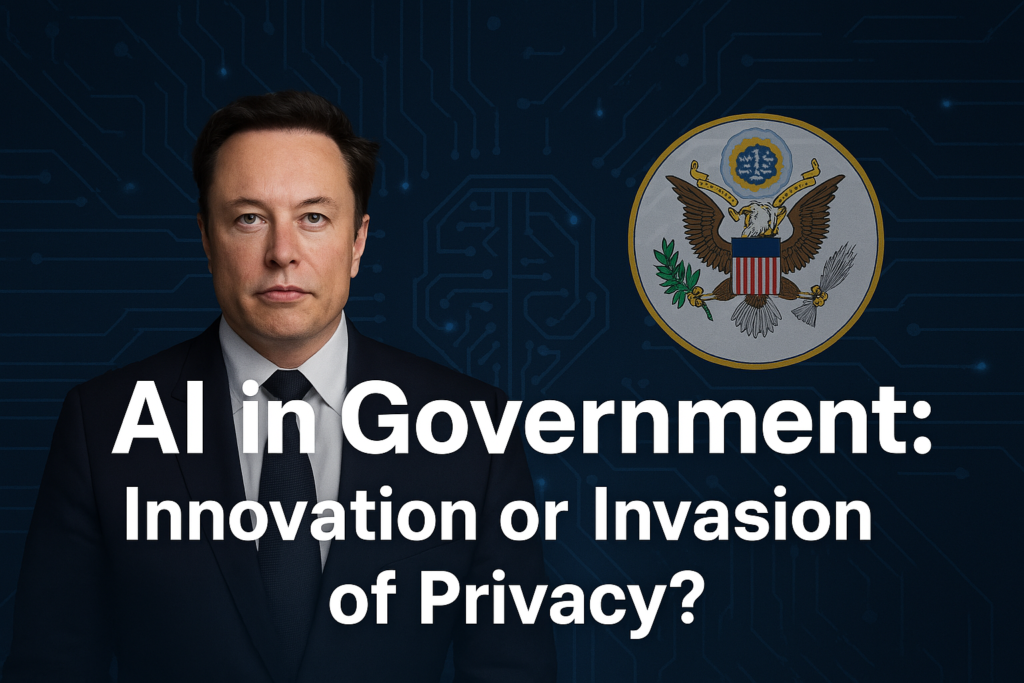AI in Government: Innovation or Invasion of Privacy?

Introduction
Artificial Intelligence (AI) is rapidly transforming industries, and now, the federal government is looking to embrace its power. Backed by influential figures like Elon Musk, the Trump administration is pushing for widespread AI adoption across various federal agencies. The promise? More efficiency, fraud prevention, and cost savings. But beneath the surface, critics warn of legal breaches, privacy violations, and national security threats.
This blog explores the controversial AI-driven transformation of the U.S. government and what it could mean for privacy, transparency, and democracy.
1. The Push for AI in Government
The Trump administration is making a massive push to modernize the federal government using Artificial Intelligence. Elon Musk, known for innovation in Tesla and SpaceX, is now influencing government operations by promoting:
-
Smaller government structures
-
More automation
-
Faster, AI-driven processes
Thomas Shed, a former Tesla engineer, is now leading these efforts through the Technology Transformation Services (TTS). He recently spoke about implementing AI in critical government services, including fraud detection and identity verification.
2. What Is Login.gov and Why It’s at the Center
Login.gov is the federal government’s digital identity platform. It allows U.S. citizens to access services from over 50 agencies, including the Social Security Administration. With around 50 million users, it’s vital to daily government operations.
The new plan proposes:
-
Connecting Login.gov with sensitive databases like Social Security
-
Using AI to verify identities and detect fraud
-
Creating secure APIs for deeper data access
While this could improve service delivery, it raises massive legal and ethical questions.
3. Legal and Ethical Storm: Privacy Act Violations
A major concern is the Privacy Act of 1974, which prohibits government agencies from sharing personal data without consent.
Concerns raised:
-
AI integration could violate these protections
-
Internal push to find “workarounds” rather than getting legal approval
-
Lack of transparency around data access
Government employees flagged these moves as potentially illegal, suggesting that skipping user consent would lead to lawsuits and loss of public trust.
4. Musk’s Growing Influence and Its Risks
Elon Musk’s involvement goes beyond tech suggestions. He’s reportedly had close allies appointed to key roles in:
-
The General Services Administration
-
The Office of Personnel Management
Critics argue:
-
Many appointees lack security clearances
-
Silicon Valley’s fast-moving mindset doesn’t suit government operations
-
Musk is pushing for privatization and tech dominance in public services
This shift could reduce oversight and accountability in how decisions are made.
5. National Security Concerns
The AI rollout isn’t just a tech issue – it’s a security one.
Alarming developments include:
-
Attempted access to USAID’s classified systems
-
Shutdown of federal email accounts
-
CIA taking precautionary measures to protect agents and intelligence
Experts say unauthorized access by underqualified teams is comparable to a cyber attack, raising urgent concerns about data safety.
6. The Battle Over Federal Tech Teams
The Musk-backed administration is also targeting internal federal tech divisions like 18F, known for successful digital projects like:
-
IRS Direct File program
-
Digital Accountability and Transparency Act tools
Tactics being used:
-
Offering “resignation incentives”
-
Holding secretive private meetings
-
Pressuring experienced workers to step down
This has created tension and uncertainty within the federal workforce.
7. Pros and Cons of AI in Government
Benefits:
-
Faster service delivery
-
Cost savings through automation
-
Better fraud detection
-
Improved public interfaces for citizens
Risks:
-
Privacy violations
-
Unauthorized data access
-
Legal consequences from violating consent laws
-
Lack of human oversight
-
Increased influence of private tech interests
8. Final Thoughts: Efficiency or Overreach?
AI has the power to transform how the government works – but at what cost? While efficiency is crucial, trust, legality, and ethical standards must come first. Rushing into AI without public transparency or legal clearance could lead to a backlash that sets progress back for years.
Whether Elon Musk is reshaping government for the better or steering it toward chaos remains to be seen. One thing is clear: we need public dialogue, legal review, and strict oversight before making permanent changes to how our data is used and who controls it.
9. FAQs
Q1. What is Login.gov used for?
Login.gov is a secure system for accessing federal services like Social Security, immigration, and taxes.
Q2. Why are changes to Login.gov controversial?
The proposed changes involve connecting it to sensitive databases without clear legal consent, potentially violating privacy laws.
Q3. What does the Privacy Act of 1974 say?
It prohibits government agencies from sharing personal information without user consent.
Q4. Who is Thomas Shed?
A former Tesla engineer leading the push for AI in government through TTS.
Q5. Is AI already used in the government?
Yes, for fraud detection, cybersecurity, and processing applications.
Q6. What is 18F?
A digital team within the GSA that helps modernize government tech projects.
Q7. How is Elon Musk involved?
He has influence over the administration’s tech strategy and personnel appointments.
Q8. Could these AI changes improve government services?
Yes, but only if implemented legally and ethically with strong safeguards.
Q9. Why is the CIA concerned?
Because unauthorized individuals attempted to access sensitive classified systems.
Q10. Is this about personal gain for Musk?
Some critics believe so, though supporters argue it’s about innovation.